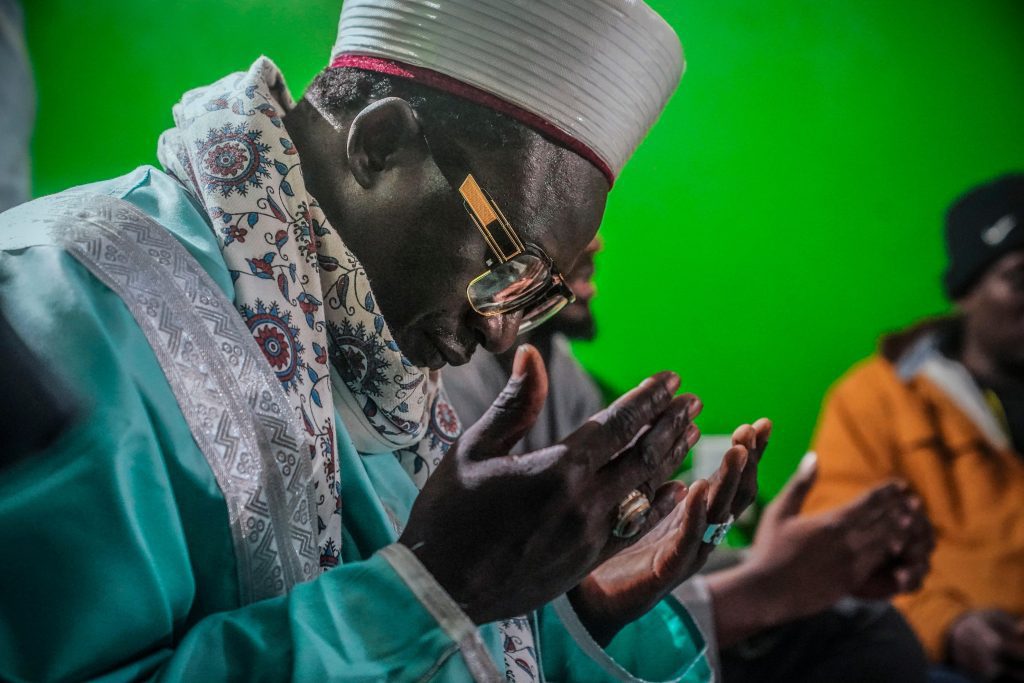By PHILIP MARCELO (Associated Press)
In New York City’s Harlem neighborhood, a mosque congregation hosts iftar, the traditional Islamic end of fast meal, for hundreds of hungry migrants every night during Ramadan above a bodega.
In the Bronx, an imam has converted the two-story brick residence housing his mosque into a makeshift overnight shelter for migrants, many of whom are men from Senegal.
Islamic institutions in New York City are struggling to meet the needs of the city’s migrant population as more asylum seekers from Muslim-majority African countries arrive. This challenge has become more difficult during Ramadan, which started on March 11 and ends on April 9.
Many mosques have welcomed migrants during the daytime hours, becoming de facto day centers where newcomers can find a peaceful place to rest and recover after spending restless nights sleeping on the streets or in the subway.
Muslim leaders have intensified their requests for donations of money, food, clothing, and other supplies in recent days.
Moussa Sanogo, assistant imam at the Masjid Aqsa-Salam in Harlem, expressed, “We’re doing what we can do, but we can’t do everything. That’s the bottom line. These brothers, they don’t eat enough. They’re starving when they get here. Can you imagine? Starving. In America.”
Imam Omar Niass, who leads Jamhiyatu Ansaru-Deen, the mosque in the Bronx, mentioned that providing a place for newly arrived migrants to stay is the least he can do, even though it has come at great personal expense.
His utility bills have long surpassed his ability to pay. He estimates he’s behind about $7,000 on the home’s electricity service and another $11,000 on water service.
He added, “In our culture, you can’t deny the people who come to the mosque. We keep receiving the people because they have nowhere to go. If they come, they stay. We do what we can to feed them, to help them.”
In the latest surge of migrants, over 185,000 asylum seekers have arrived in New York City since the spring of 2022, with Africans from majority Muslim nations like Senegal, Guinea, and Mauritania among the top nationalities represented in new cases in federal immigration courts in the state.
According to Assefash Makonnen, of African Communities Together, a Harlem-based advocacy group supporting African immigrants, New York City’s approximately 275 mosques were among the first places to feel the impact of the African wave, as they’re often migrants’ first stop upon arriving in the city.
However, she mentioned that relying solely on the generosity of faith-based communities, many of which are already struggling, isn’t sustainable in the long run.
Last summer, Democratic Mayor Eric Adams announced a program with the goal of providing funding, security, and other support for up to 75 mosques, churches, and synagogues that agreed to offer overnight shelter to migrants.
Up to now, only six places of worship with about 100 beds have been given permission to offer extra space for the over 64,000 migrants housed by the city in hotels and other shelters.
Bishop Matthew Heyd of the Episcopal Diocese of New York explained that many faith-based buildings are older and don't meet current fire safety standards, which makes it a challenge for them.
He mentioned that with more practical regulations, places of worship are ready to offer 5,000 more beds for migrants at a lower cost compared to what the city currently pays for sheltering them in hotels.
Heyd expressed a desire for faith-based shelters to be part of the solution, noting that they have been involved in addressing the city's homeless crisis in the past.
In response to concerns, the city reduced the maximum number of beds allowed at faith-based shelters from 19 to 15, meaning they are not required to have sprinkler systems according to city building codes.
She stated that efforts are being made to make necessary changes, considering the health and safety of the sheltered individuals as the main priority, while emphasizing the need for proper processes to convert a church into a shelter.
Niass in the Bronx mentioned that he hasn't given much thought to the city program. He also emphasized that he doesn't charge rent to migrants, unlike the illegal and overcrowded migrant boarding houses the city has recently closed down.
However, the conditions at the mosque are not ideal.
During a recent visit, men were resting on the floor of a basement prayer room between the five prayer times. Others were relaxing in the backyard, where there was a microwave and hot water kettle for basic meals, as well as a shed for luggage storage and file cabinets for mail. Nearby was a portable toilet covered in a blue tarp that was not effective in masking odors, which attracted flies.
Malick Thiam, a Senegalese migrant staying at Niass’ mosque for about a month, expressed gratitude for the hospitality but looks forward to finding his own place.
The 29-year-old, who arrived in the country in August, recently started working making late-night food deliveries. He typically returns to the mosque when others are heading for early morning work shifts to avoid conflicts over sleeping spots.
Thiam acknowledged challenges at the mosque, including conflicts and other difficulties, emphasizing that living there is very tough.
Alphabacar Diallo in Harlem is also grateful for the support provided by Masjid Aqsa-Salam but is eager to move forward with his life.
Until then, the mosque provides him with warmth, food, and a close connection to his faith.
He said in French, using a translator, that he doesn't know where he would be without the mosque.
___
Follow Philip Marcelo on twitter at twitter.com/philmarcelo.









